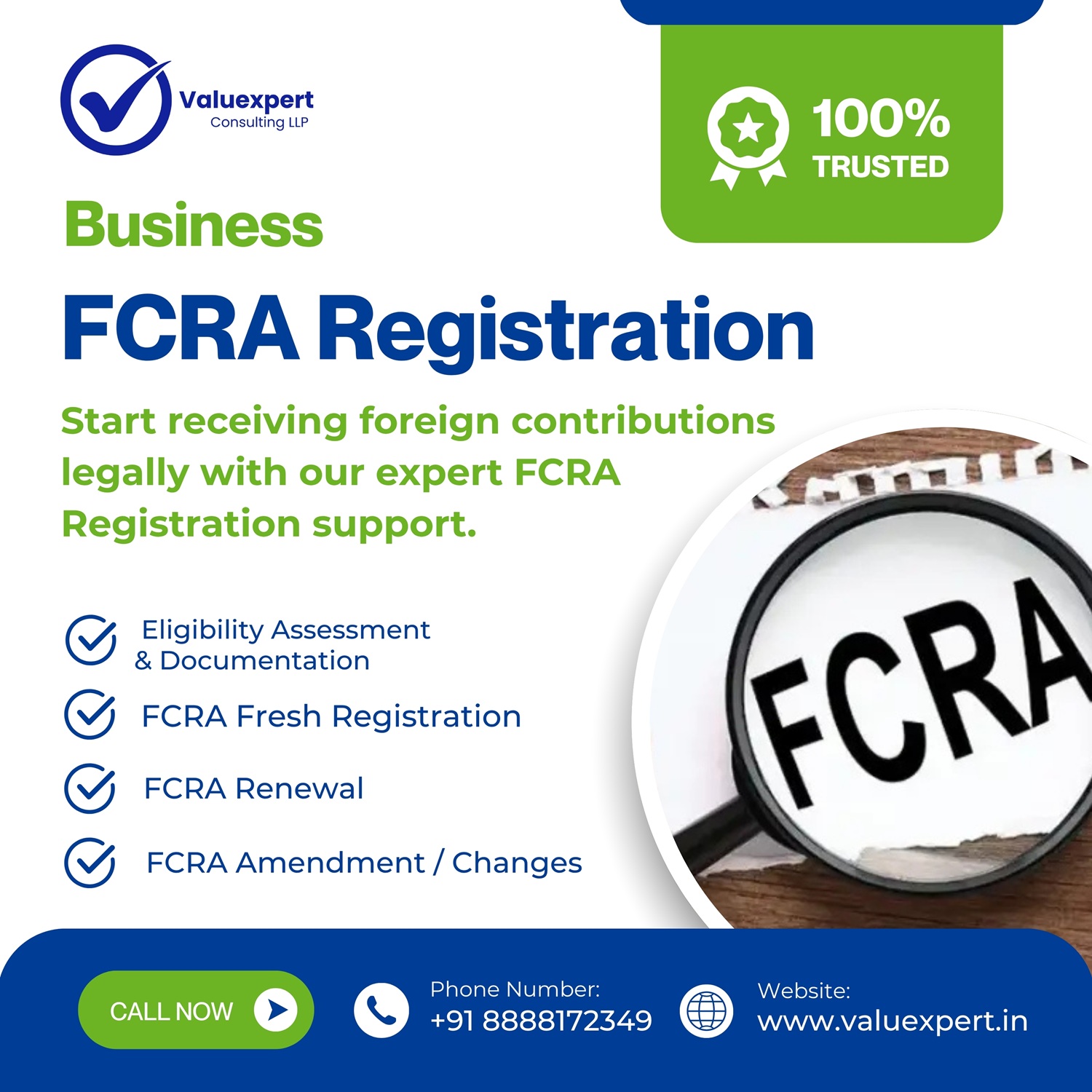FCRA Registration

"Empowering Indian NGOs: Secure FCRA Registration for Transparent Global Impact!"
Introduction:
The Foreign Contribution Regulation Act (FCRA), 2010 regulates the acceptance and utilization of foreign contributions or donations by certain entities in India. Obtaining FCRA registration is crucial for organizations engaged in cultural, social, economic, educational, or religious activities that seek financial support from foreign sources. This registration ensures compliance with legal norms and facilitates transparent management of foreign funds.
Eligibility Criteria for FCRA Registration:
Organizations aspiring to obtain FCRA registration must fulfill specific eligibility requirements:
1. Legal Structure: Typically, FCRA registration is sought by Trusts, Societies, or Section 8 Companies (under the Companies Act, 2013).
2. Existence: The applicant entity must have been operational for at least three years from the date of its registration.
3. Financial Threshold: The organization should have incurred a minimum expenditure of Rs. 10,00,000 over the past three years on its stated objectives, excluding administrative expenses. Audited financial statements prepared by a Chartered Accountant must substantiate this expenditure.
4. No Prior Violations: The organization must not have previously received any foreign contribution without obtaining prior approval under FCRA or violated any provisions of the Act.
Types of FCRA Registration:
There are two main types of FCRA registration:
1. FCRA Registration: This allows the organization to receive foreign contributions through a continuous process. Once registered, the entity can receive funds from foreign donors without seeking prior permission for each transaction.
2. Prior Permission (PP): Newly registered entities or those not meeting the eligibility criteria for FCRA registration can seek approval for specific activities, purposes, and donors through the PP route. This permission is granted for a particular duration or project.
Application Process for FCRA Registration:
The process for obtaining FCRA registration involves several steps:
1. Preparation: Gather the following documents:
a) Self-certified copy of the registration certificate (Trust Deed, Memorandum of Association, AOA).
b) Copies of audited financial statements for the past three years, including:
c) Statement of Income and Expenditure
d) Statement of Receipts and Payments
e) Statement of Assets and Liabilities
f) Activity report detailing the organization’s activities over the last three years.
2. Form FC-3: Fill out Form FC-3, available on the FCRA online portal (https://fcraonline.nic.in). Provide accurate details regarding the organization’s objectives, financials, and activities.
3. Document Submission: Upload scanned copies of all required documents along with Form FC-3 on the FCRA online portal.
4. Fee Payment: Pay the prescribed fee online for processing the FCRA application.
5. Verification and Approval: The Ministry of Home Affairs examines the application to ensure compliance with FCRA norms. Factors considered include the organization's integrity, past conduct, and potential impact on national interests.
Online FCRA Registration Process:
1. Access the Portal: Visit the FCRA online portal and navigate to the FCRA registration section.
2. Form Submission: Select the FCRA registration application link and fill out Form FC-3 with accurate information.
3. Document Upload: Upload scanned copies of all necessary documents, ensuring clarity and completeness.
4. Fee Payment: Pay the applicable fee online using the portal’s secure payment gateway.
5. Verification and Approval: After submission, the Ministry verifies the application and may seek additional information if required. Upon approval, FCRA registration is granted for a period of five years.
Renewal of FCRA Registration:
To maintain continuity in receiving foreign contributions, organizations must apply for FCRA renewal six months before the expiry of their current registration. The renewal process ensures ongoing compliance with FCRA regulations and facilitates uninterrupted receipt of foreign funds.
Conclusion:
FCRA registration empowers charitable trusts, societies, and Section 8 companies to engage effectively with international donors while ensuring transparency and accountability in fund utilization. By adhering to the procedural requirements and maintaining ethical standards, organizations can contribute significantly to social welfare and developmental initiatives in India.
